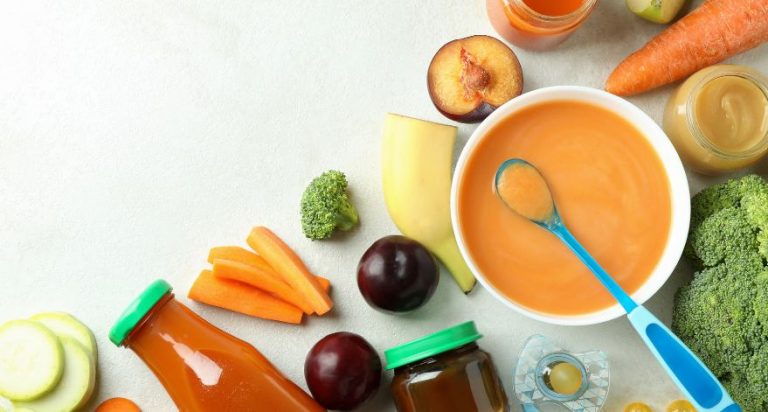From Purees to Pitfalls: Managing Your Baby’s Diet
Healthy and Unhealthy Foods for Babies
Nutrition during the first year of life lays the foundation for a child’s growth, development and lifelong eating habits. Choosing the right foods can support brain function, build immunity and promote healthy physical growth. But not all foods are baby-friendly. Some are hard to digest, offer little nutrition or pose real dangers. Let's look at healthy and unhealthy foods for babies, and practical tips for building a balanced diet.
6 Healthy Foods for Babies
1. HiPP Baby Formula
When breastfeeding isn’t possible or when families want a supplement, HiPP baby formula is a trusted option. Made with organic ingredients, HiPP closely mimics the composition of breast milk and avoids unnecessary additives like artificial sweeteners, starches and GMOs. It contains prebiotics and probiotics to support healthy digestion, plus key vitamins and minerals like calcium, vitamin D and iron. HiPP is also gentle on sensitive tummies, making it a reliable first choice for infant nutrition.
2. Homemade Purées and Blended Foods
Making baby food at home gives parents control over ingredients and textures. Blended fruits, vegetables or grains ensure freshness and allow babies to experience natural flavors without added sugar, salt or preservatives. For example, steamed carrots, sweet potatoes or peas blend into smooth purées rich in vitamins A and C. Homemade food also helps babies adapt to a variety of tastes, which may reduce picky eating later in life.
3. Mashed Fruits
Soft fruits like bananas, avocados or cooked apples are packed with essential nutrients. Bananas provide potassium for muscle and heart health, avocados supply healthy fats for brain development and apples offer fiber for digestion. These fruits are easy to mash into baby-safe textures and serve as nutrient-dense snacks.
4. Iron-Fortified Cereals
By six months of age, a baby’s natural iron stores begin to decline, making iron-rich foods critical. Single-grain, iron-fortified cereals like oatmeal or rice cereal help prevent iron-deficiency anemia. They are gentle on the stomach, can be thinned with formula or breast milk and serve as a good transition from liquids to solids.
5. Full-Fat Yogurt
Calcium and protein are vital for bone growth, and yogurt provides both along with probiotics for gut health. Babies under one should always have full-fat dairy to support brain development. Choosing unsweetened yogurt avoids excess sugar while still offering a creamy, nutrient-rich food.
6. Soft-Cooked Vegetables
Vegetables such as zucchini, pumpkin and green beans, when cooked until very soft, make excellent first foods. They deliver fiber, vitamins and minerals and can be easily mashed or blended. Introducing a variety of veggies early helps develop a taste for them, setting the stage for healthy eating habits.
5 Unhealthy and Dangerous Foods for Babies
While many whole foods are safe and healthy, some should never be given to infants.
1. Honey
Honey can contain spores of Clostridium botulinum, which may cause infant botulism, a rare but serious illness. Babies under 12 months should never be given honey, even in small amounts.
2. Cow’s Milk as a Drink
Before the age of one, cow’s milk should not replace formula or breast milk. It can be too harsh on developing kidneys, may interfere with iron absorption and does not provide the right balance of nutrients. Cow’s milk can be safely introduced in small amounts in cooking, but not as a main drink until after the first birthday.
3. Whole Nuts and Popcorn
These foods are choking hazards. While nut butters (spread very thinly) may be introduced carefully after six months to reduce allergy risk, whole nuts and popcorn are unsafe for babies and toddlers.
4. Sugary Foods and Juices
Added sugars offer no nutritional benefit and can lead to tooth decay, excess weight gain and poor eating habits. Babies do not need juice or sweetened foods. Their natural taste buds are still developing, and fruits provide all the sweetness they need.
5. Salty and Processed Foods
Babies’ kidneys are not mature enough to handle high levels of sodium. Processed foods such as chips, canned soups and cured meats should be avoided. Fresh, whole foods provide all the sodium a baby requires naturally.
Tips for Maintaining a Healthy Baby Diet
1. Prioritize Breast Milk or Formula
Until 12 months, breast milk or formula should remain the primary source of nutrition. Solid foods should complement, not replace, milk feedings during the first year.
2. Introduce One New Food at a Time
Waiting 3–5 days before introducing another new food helps parents identify possible allergies or intolerances.
3. Offer Variety
Rotate between different fruits, vegetables, grains and proteins to ensure a wide range of nutrients and encourage adventurous eating.
4. Watch Texture and Safety
Always cook, mash or blend foods into appropriate textures for your baby’s age to reduce choking risks.
5. Avoid Added Salt and Sugar
Babies don’t need extra seasoning. Keep flavors simple, fresh and natural.


